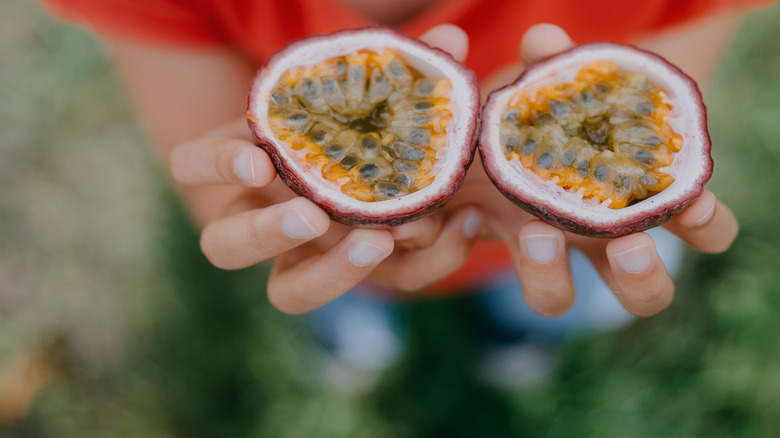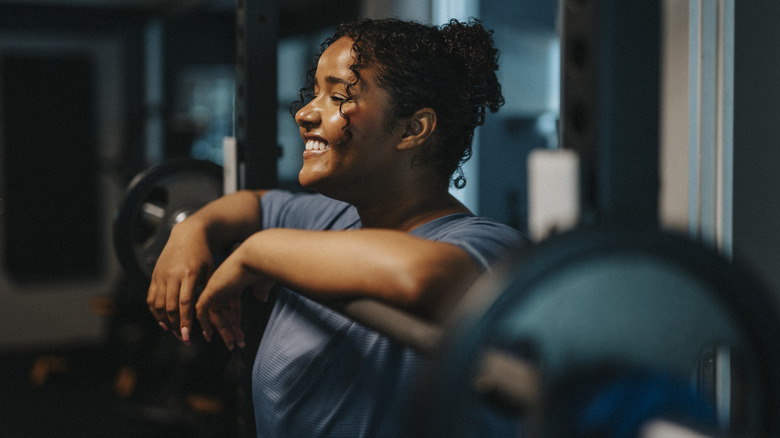
Functional foods are those that contain a range of nutrients and, consequently, harbor potential health advantages. This means you can check off many nutritional boxes by eating a single functional food, allowing you to get a bigger impact out of every meal.
That said, you may want to choose functional foods carefully. According to registered dietitian and certified dietary nutritionist Toby Amidor (via Food and Wine), many so-called functional foods are more hype than help. Says Amidor, “We are seeing protein added to chocolate, and dyes taken out of gummies. Does that make them better? No. It is still candy and added sugar.”
There’s an easy fix for this problem: Reach for foods in their rawest edible forms (as long as they’re safe). Fruits and veggies, for instance, tend to be good options if you’re seeking functionality without unwanted processing. And if your goals include increasing your magnesium, vitamin C, and protein intake, you can count on passion fruit to deliver.
Passion fruit flourishes in tropical regions but has become increasingly available throughout the United States. If you’ve never tried passion fruit, you’re in for a sweet-sour surprise. The flesh and seeds are bursting with a flavor many have called reminiscent of melon. Yet passion fruit carries some tart overtones, too. Therefore, you may prefer to mix passion fruit pulp into another food, such as yogurt, or make passion fruit the base for a fresh salad.
Pure fruit, pure nutrition

One cup of passion fruit contains 68.3 milligrams of magnesium, 70.8 milligrams of vitamin C, and 5.19 grams of protein. (As a side note, the same serving size also offers 151 micrograms of vitamin A.) In other words, passion fruit has a lot of health benefits to offer if you’re attempting to fill your nutritional gaps through whole foods rather than with supplements or processed choices.
For instance, your body depends on having enough magnesium to help control your blood pressure and blood sugar, keep your bones and muscles strong, and optimize the capabilities of your nervous system. As an adult, you want to get anywhere from 310 to 420 milligrams of magnesium daily, depending upon your age and gender. Eating a cup of passion fruit can give you a high dose of magnesium in a single sitting.
Meanwhile, vitamin C is often heralded for its ability to support the immune system; it’s also an antioxidant. Vitamin A is another member of the “vitamins that are also antioxidants” club, which makes passion fruit an excellent antioxidant source.
Immunity, systemic resilience, and muscle support

Antioxidants bolster your body’s resilience to the risks of oxidative stress, such as the development of cardiovascular disease, cancer cells, and diabetes. Since 70 to 95 micrograms of vitamin C is a sufficient daily objective for adults (again, depending on whether you’re a woman or man), adding a cup of passion fruit will practically get you all the vitamin C you need.
Additionally, passion fruit is one of the fruits that are surprisingly high in protein, as it contains nearly as much protein as a large egg (which has about 6 grams). When you’re getting enough protein, your body is able to consistently repair and develop your muscles. You may also find it easier to stave off hunger pangs because protein tends to produce higher degrees of satiety. In fact, a 2017 review in Food Hydrocolloids called protein “the most effective food macronutrient providing a satiating effect.” That said, passion fruit is an incomplete protein, as it only contains four of the nine essential amino acids, per a 2020 review in Frontiers in Pharmacology.
“`




